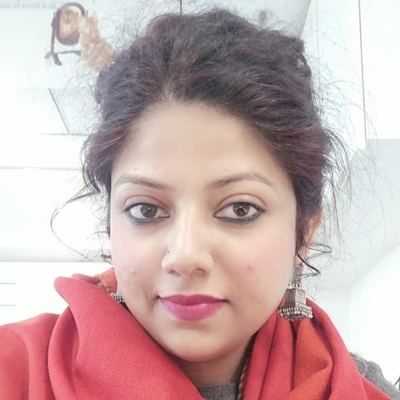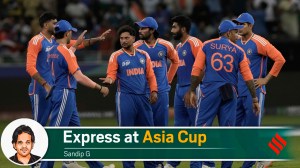Priya Kumari Shukla is a Senior Copy Editor in the Indian Express (digital). She contributes to the UPSC Section of Indian Express (digital) and started niche initiatives such as UPSC Key, UPSC Ethics Simplified, and The 360° UPSC Debate. The UPSC Key aims to assist students and aspirants in their preparation for the Civil Services and other competitive examinations. It provides valuable guidance on effective strategies for reading and comprehending newspaper content. The 360° UPSC Debate tackles a topic from all perspectives after sorting through various publications. The chosen framework for the discussion is structured in a manner that encompasses both the arguments in favour and against the topic, ensuring comprehensive coverage of many perspectives. Prior to her involvement with the Indian Express, she had affiliations with a non-governmental organisation (NGO) as well as several coaching and edutech enterprises. In her prior professional experience, she was responsible for creating and refining material in various domains, including article composition and voiceover video production. She has written in-house books on many subjects, including modern India, ancient Indian history, internal security, international relations, and the Indian economy. She has more than eight years of expertise in the field of content writing. Priya holds a Master's degree in Electronic Science from the University of Pune as well as an Executive Programme in Public Policy and Management (EPPPM) from the esteemed Indian Institute of Management Calcutta, widely recognised as one of the most prestigious business schools in India. She is also an alumni of Jamia Milia Islamia University Residential Coaching Academy (RCA). Priya has made diligent efforts to engage in research endeavours, acquiring the necessary skills to effectively examine and synthesise facts and empirical evidence prior to presenting their perspective. Priya demonstrates a strong passion for reading, particularly in the genres of classical Hindi, English, Maithili, and Marathi novels and novellas. Additionally, she possessed the distinction of being a cricket player at the national level. Qualification, Degrees / other achievements: Master's degree in Electronic Science from University of Pune and Executive Programme in Public Policy and Management (EPPPM) from Indian Institute of Management Calcutta ... Read More
UPSC Key- April 3, 2023: Know about Lithium, Bombay Natural History Society and Vaikom Satyagraha
Exclusive for Subscribers from Monday to Friday: The Indian Express UPSC Key April 3, 2023 will help you prepare for the Civil Services and other competitive examinations with cues on how to read and understand content from the most authoritative news source in India.
 UPSC Key April 2023: Here's what you should be reading from the April 3, 2023 edition of The Indian Express
UPSC Key April 2023: Here's what you should be reading from the April 3, 2023 edition of The Indian Express Important topics and their relevance in UPSC CSE exam for April 3, 2023. If you missed the March 31, 2023 UPSC key from the Indian Express, read it here
FRONT PAGE
‘India achieved it’: ISRO Reusable Launch Vehicle passes landing test
Syllabus:
Preliminary Examination: Current events of national and international importance.
Mains Examination: General Studies III: Science and Technology- developments and their applications and effects in everyday life.
Key Points to Ponder:
• What’s the ongoing story-The Indian Space Research Organisation (ISRO) on Sunday successfully conducted an experiment that it said would propel the country forward in its goal to send reusable rockets into space. The space agency conducted the ‘Reusable Launch Vehicle Autonomous Landing Mission (RLV LEX)’ at the Aeronautical Test Range of the Defence Research and Development Organisation (DRDO) in Karnataka’s Chitradurga district.
• What is ‘Reusable Launch Vehicle Autonomous Landing Mission (RLV LEX)’?
• What do understand by the Reusable Launch Vehicle?
• What is ISRO’s RLV TD project?
• For Your Information-According to ISRO, the series of experiments with the winged RLV-TD are part of efforts at “developing essential technologies for a fully reusable launch vehicle to enable low-cost access to space”. The RLV-TD will be used to develop technologies like hypersonic flight (HEX), autonomous landing (LEX), return flight experiment (REX), powered cruise flight, and Scramjet Propulsion Experiment (SPEX). ISRO’s RLV-TD looks like an aircraft. It consists of a fuselage, a nose cap, double delta wings, and twin vertical tails. The 2016 experiment involved sending a winged spacecraft on a rocket powered by a conventional solid booster (HS9) engine used by ISRO into space. The spacecraft travelled at a speed of Mach 5 (five times the speed of sound) when re-entering the earth’s orbit and travelled a distance of 450 km before splashdown in the Bay of Bengal.
• How old is the RLV project?
• What was the first RLV experiment about?
• And what was the second experiment conducted recently?
• What was the difference in the two tests?
• What are its advantages?
• How advanced are RLV technologies globally?
Other Important Articles Covering the same topic:
📍ISRO’s Reusable Launch Vehicle Mission RLV LEX: Why the experiment was carried out
Lithium find in J&K: Chile, with most reserves, ready to share know-how
Syllabus:
Preliminary Examination: General Science
Main Examination: General Studies III: Science and Technology- developments and their applications and effects in everyday life.
Key Points to Ponder:
• What’s the ongoing story– Chile, the country endowed with most lithium reserves and home to SQM, the second largest global lithium producer, is keen to partner with India on tapping into the lithium value chain. This includes potentially extending technical expertise in exploiting the newly established “inferred” lithium resources of 5.9 million tonnes in Salal-Haimana area of Reasi district in Jammu and Kashmir.
• What is Lithium?
• Map Work-Chile and Reasi district in Jammu and Kashmir
• Do You Know-The ‘inferred’ reserves of 5.9 mn tonnes in J&K’s Reasi are in mineral form unlike Chile’s salt pans. However, Chile-based SQM, world’s largest producer of lithium, has a venture in Australia to tap lithium in mineral
form.
• In the ‘Inferred reserve’, what is the meaning of ‘inferred’?
• For Your Information-The Geological Survey of India (GSI), an attached office of Ministry of Mines, carried out a G3 stage fairly advanced mineral exploration project during Field Season 2020-21 and 2021-22 in Salal-Haimna areas of Reasi district, Jammu & Kashmir and estimated an inferred resource of 5.9 million tonnes of lithium ore and the report has been handed over to the Government of the Union Territory of J&K. The estimated value of lithium at that site will be estimated on completion of further exploration.
• Why India wants Lithium?
• Some More Points-Lithium can be extracted in different ways, depending on the type of the deposit — generally either through solar evaporation of large brine pools, or from hard-rock extraction of the ore. In India, there is some potential to recover lithium from brines of Sambhar and Pachpadra areas in Rajasthan, and Rann of Kutch, Gujarat. The major mica belts located in Rajasthan, Bihar and Andhra Pradesh and the pegmatite belts in Odisha, Chhattisgarh, alongside rock mining being undertaken at Mandya, Karnataka, are other potential geological domains of the country.
• Lithium-Know its uses and significance
• Lithium-Know issues and challenges
• What are Lithium ion batteries?
• Lithium ion batteries-how do they work?
Other Important Articles Covering the same topic:
📍Lithium ‘inferred’ in J&K — how significant is this find, what next?
THE CITY
At Asola Bhatti sanctuary, a ‘seed bank’ of plants native to the Aravallis
Syllabus:
Preliminary Examination: General issues on Environmental ecology, Bio-diversity and Climate Change – that do not require subject specialization.
Mains Examination: General Studies III: Conservation, environmental pollution and degradation, environmental impact assessment.
Key Points to Ponder:
• What’s the ongoing story– A ‘seed bank’, which collects and stores seeds of species of plants that are native to the Aravallis, is gradually taking shape at a nursery at the Asola Bhatti Wildlife Sanctuary, after a few years of efforts at collecting seeds from across the city and other states. The project, being implemented jointly by the Forest Department and the Bombay Natural History Society (BNHS), began in 2015 with the purpose of providing saplings that are native to the city and bringing back species that are now difficult to find in the city with some having lost out to invasive species like the vilayati kikar which have taken over the Ridge.
• What is meant by seed bank?
• What is meant by seed bank?
• Bombay Natural History Society (BNHS)-Know in detail
• What is meant by invasive species?
• Salai (Boswellia serrata), phalsa (Grewia asiatica) and vilayati kikar- Indigenous or Invasive?
• Map Work-Aravallis (North to south and east to west stretch) and Asola Bhatti Wildlife Sanctuary,
• Which peak is the highest point of the Aravalli Range?
• The Aravalli Range is arguably the oldest geological feature on Earth, having its origin in which era?
• The Aravalli Range, is believed to be the oldest range of fold mountains in India-True or False?
• What is fold mountain?
• For Your Information-The project, being implemented jointly by the Forest Department and the Bombay Natural History Society (BNHS), began in 2015 with the purpose of providing saplings that are native to the city and bringing back species that are now difficult to find in the city with some having lost out to invasive species like the vilayati kikar which have taken over the Ridge.
Other Important Articles Covering the same topic:
📍How Delhi’s Asola Bhatti Wildlife Sanctuary is becoming more welcoming to leopards, and humans
Previous Year Prelims questions based on similar theme:
📍With reference to Bombay Natural History Society (BNHS), consider the following statements (For complete question, please refer GS1 Prelims Paper 2014 )
THE EDITORIAL PAGE
Syllabus:
Preliminary Examination: Current events of national and international importance.
Mains Examination: General Studies II: Government policies and interventions for development in various sectors and issues arising out of their design and implementation.
Key Points to Ponder:
• What’s the ongoing story– Vikram Mehta writes: Four decades back, Indira Gandhi walked the upstream (exploration and production) petroleum sector down from the “commanding heights” occupied by public sector enterprises to the plains of the market and competition. Her decision was driven by the strategic imperative to reduce India’s exposure to external supply shocks. In 2020, PM Narendra Modi introduced the production-linked incentive (PLI) scheme to incentivise investment, inter alia, in the minerals, components and equipment required for the generation and consumption of clean energy. His decision was driven by a similar impulse.
• What is ‘Production-Linked Incentive (PLI)’ scheme?
• How has India fared in its 40-year effort to create a self-sufficient fossil fuel energy system?
• “The liberalisation of upstream petroleum did not bridge the gap between the domestic demand for petroleum and indigenous supply”-Discuss in the backdrop of India’s attempt to have clean energy
• “India has the raw material of oil and gas. That is a geological fact. But what it does not have are the enabling conditions to monetise them”-Elaborate
• ‘The recovery rate of oil and gas from India’s producing fields’-Know in detail
• What are Enhanced oil recovery ( EOR ) technologies?
• Enhanced oil recovery ( EOR ) technologies and India-connect the dots
• The lesson for the clean energy sector is two-fold-What are those?
• “The people of Wu and Yue were mutual enemies but when they sailed on the same boats and encountered a storm, they helped each other like left and right hands”-Decode the quote
Other Important Articles Covering the same topic:
📍Explained: What a new study says about fossil fuel extraction and global warming
THE IDEAS PAGE
Syllabus:
Preliminary Examination: Economic and Social Development-Sustainable Development, Poverty, Inclusion, Demographics, Social Sector Initiatives, etc.
Mains Examination: General Studies III: Inclusive growth and issues arising from it.
Key Points to Ponder:
• What’s the ongoing story– Ashok Gulati and Raya Das write: The unseasonal spell of rains and even hailstorms in some parts of the country in the second half of March have aggravated concerns about the rabi harvest, especially wheat. Wheat, grown on almost 34 million hectares, is the second biggest staple after rice. As we write this, the Government of India (GoI) is still figuring out the extent of damage to rabi crops. What we know is that wheat was at a mature stage, and the country was expecting a bumper harvest of 112 million metric tonnes (mmt). This hope may not materialise fully now.
• Why some parts of country experienced unseasonal rains?
• Wheat Production in India-Rabi or Kharif Crop?
• Wheat Production in India-Know all the facts like Highest producing States, Geography and Environment associated with Wheat Production like Soil, temperature, Rainfall and Humidity etc.
• How does one compensate the farmers for their losses (crop quantity and quality)?
• ‘The best policy instrument for these types of weather-related damages, be it unseasonal rains, hails or heat waves, is the PM-Fasal Bima Yojana (PMFBY)’-Elaborate
• What are the features of PMFBY?
• Pradhan Mantri Fasal Bima Yojana (PMFBY)-Key Highlights
• What is the purpose of Pradhan Mantri Fasal Bima Yojana?
• Which crops are covered under PM Fasal Bima Yojana?
• Pradhan Mantri Fasal Bima Yojana (PMFBY) scheme shall be implemented by whom?
• Only small and marginal farmers growing notified crops in a notified area are eligible-True or false?
• Who is a farmer?
• What is the government’s definition of a farmer?
• What types of Risks to be covered & exclusions?
Other Important Articles Covering the same topic:
EXPLAINED
Why bedaquiline patent decision could hold key to 2025 TB goal
Syllabus:
Preliminary Examination: Economic and Social Development-Sustainable Development, Poverty, Inclusion, Demographics, Social Sector Initiatives, etc.
Main Examination: General Studies II: Issues relating to development and management of Social Sector/Services relating to Health, Education, Human Resources.
Key Points to Ponder:
• What’s the ongoing story– The patent office in India rejected the secondary patent of the Johnson and Johnson’s TB medication bedaquiline, used for the treatment of those with drug resistant infections. The decision prevented the best drug in the class from being locked up in patent for another four years after its primary patent expires in July this year. Experts, health activists, and survivors welcomed the decision as generic versions are likely to bring down the cost of the medicine and improve access.
• What is bedaquiline and why is it the need of the hour?
• For Your Information-At the time of receiving an approval from US Food and Drug Administration in 2012, bedaquiline became the first new TB therapy to become available after a period of 40 years. But the novelty of the drug is not the only reason why there is a need for increased access. Bedaquiline is considered to be one of the most effective treatments available for drug resistant tuberculosis, with minimal side-effects as compared to the existing drugs such as Kanamycin that can lead to kidney damage and permanent hearing loss. The drug also prompted development of shorter-courses of treatment for such resistant TB – more than halving it from two years to nine month to one year course. It is also an oral medicine unlike Kanamycin or Streptomycin. A shorter-course, all-oral medicine is likely to increase odds of people completing their treatment and preventing more cases of drug resistant TB.
• On what claim did Janssen apply for a secondary patent?
• What will be the implication of the drug coming off the patent?
• Why is it important for India’s TB goal of 2025?
• National Strategic Plan 2017-2025 for TB Elimination in India-Issues and Challenges
• What will be the global impact?
• Health Sector in India-Pre and Post Pandemic
• Tuberculosis (TB) and India-Impact
• India TB Report 2021 and Global TB Report 2021-key Highlights and who publishes?
• Know the term-BCG (Bacillus Calmette-Guerin)
Other Important Articles Covering the same topic:
📍A jab or a pill, that is the tuberculosis question
Recalling Vaikom, satyagraha that led to opening of temple doors to lower castes
Syllabus:
Preliminary Examination: History of India and Indian National Movement.
Mains Examination: General Studies I: Modern Indian history from about the middle of the eighteenth century until the present significant events, personalities, issues.
Key Points to Ponder:
• What’s the ongoing story-Kerala Chief Minister Pinarayi Vijayan and Tamil Nadu Chief Minister MK Stalin, will inaugurate the centenary celebrations of the Vaikom Satyagraha, on Saturday (April 1). On March 30, 1924, in the temple town of Vaikom in the princely state of Travancore, a non-violent agitation started, marking the beginning of “temple entry movements” across the country.
• The social context of Travancore at the dawn of the 20th century and Vaikom Satyagraha-connect the dots
• ‘The rise of the Ezhava community sowed the seeds for agitations to come’-elaborate
• Who started Vaikom Satyagraha?
• What is the significance of Vaikom Satyagraha?
• Who was the prominent leader of Vaikom Satyagraha?
• For Your Information-The issue of temple entry was first raised by Ezhava leader TK Madhavan in a 1917 editorial in his paper Deshabhimani. Inspired by the success of Gandhi’s Non-Cooperation Movement, by 1920, he began to advocate for more direct methods. The 1920s saw upper-caste counter-agitations across Travancore and the Maharaja refused to institute reforms, fearing backlash from caste Hindus. While previously the British may have intervened in favour of more liberal policies to avoid social unrest, at the time, they were too caught up dealing with the Non-Cooperation Movement. However, the lower castes found a new ally. When Gandhi came to south India in 1921, Madhavan managed to arrange a meeting with him and secured his support for a mass agitation to enter temples. Due to various reasons, it would take two more years before any concrete progress was made in the matter. In the 1923 Kakinada session of the INC, a resolution was passed by the Kerala Provincial Congress Committee to take up anti-untouchability as a key issue. This was followed by a massive public messaging campaign and a movement to open Hindu temples and all public roads to avarnas. Vaikom, a small town with a revered Shiva temple, was chosen as the location for the first satyagraha.
• Mahatma Gandhi and Vaikom Satyagraha-Connect the dots
• Vaikom Satyagraha The legacy and the aftermath-Know in detail
Other Important Articles Covering the same topic:
📍Vijayan, Stalin open centenary event of anti-caste movement, talk of unity
For any queries and feedback, contact priya.shukla@indianexpress.com
The Indian Express UPSC Hub is now on Telegram. Click here to join our channel and stay updated with the latest Updates.
Photos



- 01
- 02
- 03
- 04
- 05






























